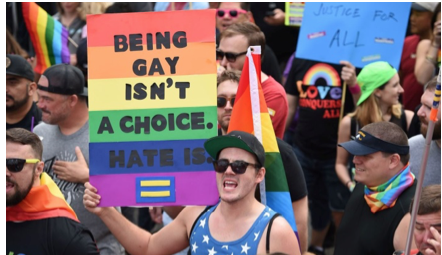CommentsWHAT DO YOU THINK?--In December, I was on a panel organized around the question of whether coming out is "like it used to be." All but one panelist declared that coming out today is much easier. I was the outlier.
To me, there is no single "coming out" experience, and I know firsthand that the pace of progress has varied widely from place to place; it is reductive and even harmful, in the case of a population not yet afforded federal protections, to flatten the experience of being gay into what it looks like on HBO or in Brooklyn.
Anti-LGBT hate-violence homicides increased toward the end of the 2016 election cycle, and 2017 saw an 86 percent increase over even 2016's high totals. While there were 28 single-incident homicides in 2016, there were 52 such killings last year. Of the 52 people slain, two thirds were under the age of 35. Almost half of the homicides of gay, queer, or bi cisgender men qualified as "hook-up violence," involving online ads or app-driven hook-ups.
In too many places, coming out isn't much different than it used to be. There are celebrities, of course -- thank God for Ellen -- and there are sitcoms and movies and other cultural signifiers, touchstones suggesting that, in the United States, it's OK, in principle at least, to be gay. But access to theoretical acceptance, to models, can only help so much in the absence of real, immediate acceptance and safety. Trying to imagine a trajectory from a hostile home or community to a Will and Grace life can be more depressing than uplifting when the path seems impossible.
What it's like to live openly also varies widely. A close, queer friend of mine in North Carolina has to guard her social media, processing every aesthetic change through the lens of extreme vulnerability. She works as a teacher, and there are parents who'd pull their kids; colleagues who'd stop talking to her; and administrators who'd fire her if she were to be half as "out" as I am in Washington, D.C. She spends hours each day in the car commuting so she can live in a place she feels safe while teaching in a place she can find work.
It isn't just place; it's also circumstance. LGBT people in America are more likely to live in poverty. A little more than a fifth of LGBT people living alone make less than $12,000 per year; that's true of only 17 percent of non-LGBT people. Transgender people are nearly four times as likely to have a household income of less than $10,000 than their cisgender counterparts. In turn, poverty makes LGBT people more vulnerable to discrimination and violence. Many LGBT people lack basic forms of security, from housing and employment to safety. Being out is still dangerous. But these aren't the stories we like to read.
Under the best social and economic conditions, different people will still always face different challenges. Sexual orientation is unlike most inborn characteristics. Being gay isn't like being Latinx, for example. That part of who I am came from a parent who could, in turn, relate to that identity. Some of us luck out, but for the most part, LGBT people aren't born into a family or a community of people who share their identity. That means that the assault on who we are can begin at home. It did for me: When a family member to whom I was out became angry with me, she threatened to "ruin my life" by outing me to the rest of the world.
The first time I dated a woman who'd grown up in a very different context -- a monied, quintessentially Californian liberal enclave -- it was a shock. She found it alien to worry about stigma. It was no less surprising, really, when a few years later a college friend-turned-more-than-friend visited me in North Carolina, in an area that was much more conservative than where I'd grown up in Durham, and didn't understand the code switch.
We could have held hands in Cambridge -- that's the first place I ever felt comfortable enough to kiss a woman in public -- but it would never have occurred to me to show that kind of affection in my home state. What I knew from a stint in Florida was that, to be seen exchanging a kiss with a woman, even in the privacy of a car, was the sort of thing that ended with a police officer requesting a license and registration. In Washington, D.C., I'd been threatened with physical violence for minimal displays of affection.
Yes, two friends have a four-year-old who's asserted a gender identity different from the one his mothers anticipated. I know people in their twenties who've been out twice as long as I have, who had open same-sex crushes and dates in middle and high school.
These are the stories that dominate media, because of the outsized influence that cities have in driving media and because they're the stories that people like to tell. The stories they like to repeat. The stories that show how enlightened we are as a society. The parents who are ashamed of their child's orientation aren't sharing that fact; they are intent on suppressing it. We're decades from "mission accomplished." Recognizing where we are is critical to reaching where we need to be.
(Rebecca Pilar Buckwalter-Poza is a contributing writer for Pacific Standard where this piece was first posted. She is a graduate of Harvard College and the Yale Law School and has written on law, politics, and policy for NPR, CNN, The Atlantic, the Daily Beast, and Politico, and appeared on MSNBC.) Prepped for CityWatch by Linda Abrams.
-cw

















